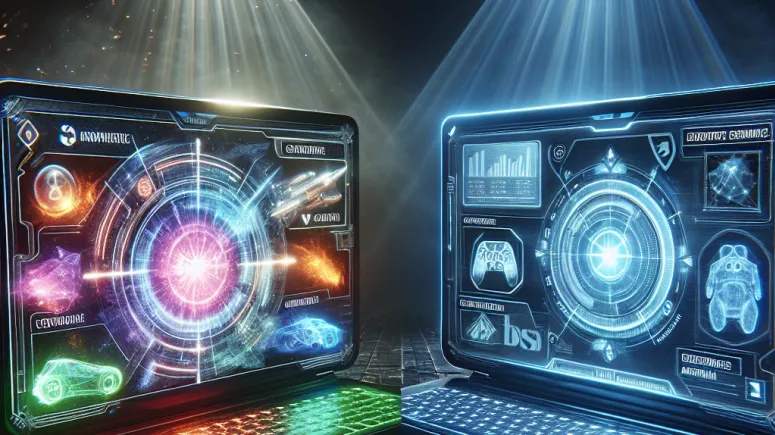Are you looking for a comprehensive comparison between HP vs Dell Laptops? This thorough review scrutinizes the features and strengths of each brand. Do you want amazing displays? The wow factor brought by Dell’s XPS line, or the pure horsepower in an HP Omen or Pavilion? Or are you more interested in a reliable business laptop? This article will help guide you through the not-always-so-simple task of finding the perfect laptop. Get ready to nerd out over specs, features, and value; we’re deep-diving into the wonderful world of Windows laptops and convertible ranches.
Table of Contents
Unveiling the Key Differences Between HP vs Dell Laptops
Exploring the distinctions between HP vs Dell laptops reveals various aspects to consider before purchasing. When comparing these brands, HP laptops are renowned for their sleek designs and innovative features. , Dell laptops are celebrated for their powerful performance and durability. This juxtaposition allows consumers to choose based on their preferences and requirements.
Design and Display HP vs Dell Laptops
One of the primary differences seen between the HP and Dell workstations is in the area of design. HP frequently emphasizes in their marketing the “exquisite” and lightweight quality of their machines. This focus on design really has to do with the primary convenience factor of the machines—for users who need to move their computers frequently and those who don’t want to feel like you’re carrying half of an airplane.
Functionality and Usage
When it comes to usefulness and use, HP and Dell PCs give a lot of options to serve a lot of different needs. HP workstations are great for that because they’re so flexible. Folks who use them range from business professionals to students. By comparison, Dell computers are often a go-to for folks who want a machine that doesn’t serve a useful need for them but also does it very fast and at a very high level. For these kinds of artists and enthusiasts, Dell computers—particularly laptops—are where it’s at.
Examining Display Features in HP Vs Dell Laptops
Exploring display traits is one way to uncover what makes HP vs Dell laptops different. People often think of HP laptops as having very colorful, vibrant displays that “pop.” Dell laptops, , are considered to feature very sharp, crisp displays that offer “perfect” clarity in every pixel.
Resolution and Clarity
When it comes to dissecting the perspectives presented in this show, the most important ones are HP vs Dell PCs. The reason this conversation is so essential is that it comes down to the simple fact that if one has to work on a computer all day, it might as well be a good-looking one. And, indeed, both HP and Dell have made significant strides in the physical appearance of their respective workstations. But for many of us in the audience, the key to this whole conversation isn’t the look, but rather the work.
Color Accuracy and Brightness
When it comes to the traits of variety, accuracy, and brilliance, HP vs Dell computers have distinct talents. HP laptops are well-known for their and consistent life of variety they show, which lets the user experience dynamic and accurate varieties in the laptop’s content. In contrast, Dell laptops are praised for the high-brightness brilliant displays they use, which make them just right for use outside or in an adequately bright setting where glare can be a concern.
The Best Gaming Capabilities: HP vs Dell
Considering the gaming abilities of HP vs Dell laptops uncovers some cool features designed especially for those who spend a lot of time on graphics-intensive games. HP is good at making sure its laptops deliver fantastic gameplay. HP has also made a name for itself by putting impressive graphics capabilities inside a relatively slim laptop chassis. They’re not quite at the level of desktop gaming rigs, but they’re not far off, either. Going up against HP in this gaming capers is the other giant in the industry, the Dell Corporation.
Graphics Performance
The graphics performance of HP and Dell workstations is one of their standout features. HP workstations have top-of-the-line graphics cards with stunning visual effects and game conditions. Dell computers, , have excellent GPUS that ensure high frame rates and seamless gameplay, a way to a better gaming experience for all users.
Processing Power and Cooling
When evaluating HP and Dell’s gaming capabilities, two important factors are their power management and cooling systems. For intense gaming, HP relies on hard processors, which deliver strong, reliable, and fast computing that can handle even the most demanding games. HP ensures on-time delivery of gamer inputs and responses.
, Dell gaming laptops are renowned for their powerful cooling systems, which make them great athletes among gaming machines. Dell laptops stay way cooler under pressure than their immediate competitors like HP, MSI, etc.
Navigating Business Needs: HP Laptops vs Dell Laptops
meeting business requirements, the HP vs Dell laptop comparison reveals special aspects that are fine-tuned for professionals. Business people know that HP’s laptops are well regarded for their reliability and the security they afford. HP’s machines are bastions of data privacy, ensuring that any business can rely on its laptops to handle even sensitive work. , Dell’s business laptops are known mainly for their workhorse performance and productivity tools, which encompass the efficiency a business person demands in a mobile office.
Reliability and Security
Addressing business requirements with HP and Dell involves focusing on dependability and security. HP has long offered strong security options. Biometrics. Data encryption. With dependable hardware and security features, HP aims to make its machines impenetrable to qualify as secure computing platforms. Dell, too, boasts of offering security you can count on as well as hardware components that can withstand the rigors of regular use. Ease of service is another area in which these two computer makers are practically neck and neck, albeit with some differences in approach (Moon, 2019).
Performance and Productivity Tools
Going deeper into business needs, the emphasis on performance and productivity tools sets HP and Dell laptops apart. HP laptops feature high-performance processors and generous memory capacity that can handle even the most demanding business applications. The result is not only smooth multitasking but also efficient execution. Meanwhile, Dell laptops sport an array of hardware and software tools that help various workgroups optimize performance on the go. On some systems, for instance, Dell’s included business-suite software—featuring a word processor, spreadsheet, and presentation program—can save you hundreds of dollars compared with Prices including delivery, setup, and recovery in the event of a catastrophic failure.
Evaluating Overall Performance and Features: HP vs Dell
One thing becomes clear when we look at the performance and features of HP vs Dell laptops side by side. Each brand has its special character. HP excels at producing laptops with interfaces and technology that are easy to use. The innovation that goes into an HP laptop easily makes up for any perception of them otherwise. Dell, meanwhile, gets good grades for the customizability of its machines and the appearance of them as rugged workhorses. It’s immediate tech that they’re pushing, even onto their consumer lineup.
User-Friendly Features
When comparing HP and Dell workstations, there are a couple of champion points worth mentioning. First is the ease of use feature; HP is designed to be easy to use. It has inbuilt user-friendly features with intuitive connecting links and convenient shortcuts. These are expected to make the HP consoles easy to navigate and the performance of any task done with them to be error-free—or, in case any errors do pop up, the kinds that are easy to correct. Dell, , is built with more settings-oriented performance in mind. It is very adjustable.
Innovative Technology Integration
When it comes to assessing performance, HP and Dell workstations stand out from the crowd for their innovative features. HP has been pushing the state of the art, with workstations that now include biometric authentication and voice recognition to interact with devices in new ways. Dell,, is highlighting more established, high-performance computing features like accelerators and solid “archival” performance. At the end of the day, both have clear visions for their workstations, and both work towards cementing their visions with real hardware and software features that can make a difference to users.






